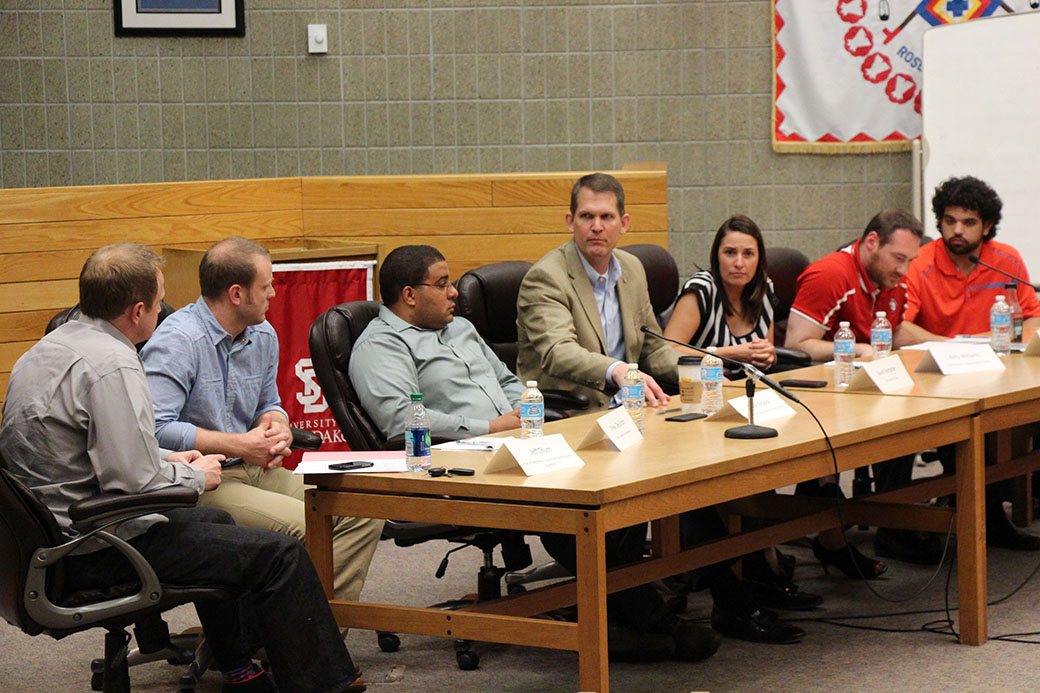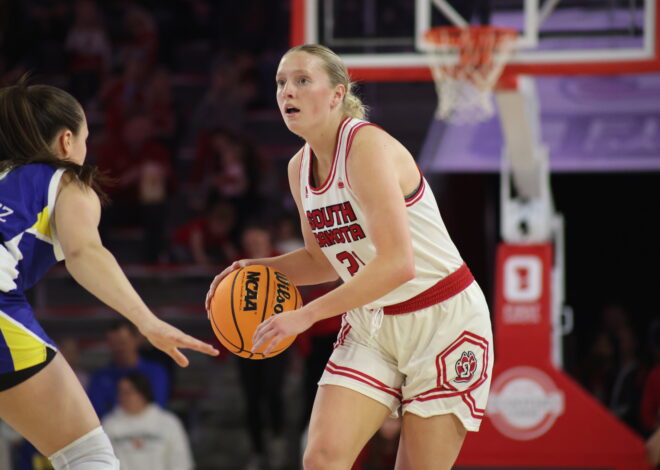
USD visits idea of student-athlete compensation
The National Collegiate Athletic Association discussed the recent change made this year of Power Five conference schools that pay for full cost of attendance for their student-athletes. While the University of South Dakota is not part of the Power Five conference, it is now the school’s choice whether to implement this system as well.
Representatives from the university including Athletic Director David Herbster, Women’s Basketball Coach Amy Williams, senior linebacker Colin Buscarni, as well as several others, gathered in the Law School courtroom April 16 to discuss if USD would be able to implement some sort of compensation for student-athletes beyond just a scholarship.
Issues discussed included where the extra compensation would come from, how the compensation would be distributed evenly among the athletes, what the form of compensation would be as far as a check or if it would come in a form of health insurance for the athlete and if the university could realistically fund such a venture.
Williams said some students still value the right of playing on scholarship, but other players who are better almost feel like their universities are taking advantage of their talents and keeping the revenue they could be making professionally.
“Some people see college as an opportunity and an experience,” Williams said during the discussion. “They love the game and want to earn an education, but there are athletes that feel like that the college system isn’t right and that their talents are better off in professional sports, and we see them leaving college after one or two years.”
Williams also believes she has a disadvantage in the recruiting track because she is unable to use what the Power Five conferences are using as far as tools to recruit by offering additional compensation beyond a scholarship.
Representatives said if they were to implement a similar payment plan as the Power Five conference schools, the only logical way it would be payed for is by booster donation. There is already a budget and guideline on how the university can evenly distribute their scholarships through the various sports on campus, so adding compensation could make it more complicated than it already is.
Distribution of pay was also discussed. If a plan were implemented that compensation may be determined by how much an athlete brings in to the university as far as revenue, a football player may be paid more than a swimmer. Because Title IX requires even compensation of men and women, each would have to be a priority to keep all parties happy and evenly paid.
As far as forms of compensation, Herbster said college athletes have no form of health insurance and could lose a scholarship due to medical reasons that make it impossible for an athlete to perform on the field or court.
“I am over 40 years old, and I am feeling some of those injuries I had as a student-athlete today,” Herbster said. “Just imagine the athletes that have serious injuries during their college careers that don’t have insurance policies that cover sports related injuries.”
The possibilities of players being able to brand themselves and their teams without the NCAA giving sanctions was also a topic of discussion.
“I think that if an athlete brands himself and a school in a socially responsible way that it shouldn’t be a problem,” Buscarni said.
He also said an athlete being sponsored by a beer or cigarette company would be socially unacceptable sponsorship.
First-year law student Bryan Reynolds also attended the meeting and said the discussion of resources, specifically comparing a school like Alabama with USD, is an important thought to consider.
“It is challenging to find a way to pay students here when we have a lot less funding than Alabama,” Reynolds said. “Is education enough to compensate student athletes? Do they need additional money being an athlete, and what is the difference in value of education and value as a student-athlete getting additional pay?”
(Photo: Athletic Director David Herbster, Women’s Basketball Coach Amy Williams and senior linebacker Colin Buscarni, along with several others, discussed the possibility of compensation for athletes in the Law School courtroom April 16. Cristina Drey / The Volante)

